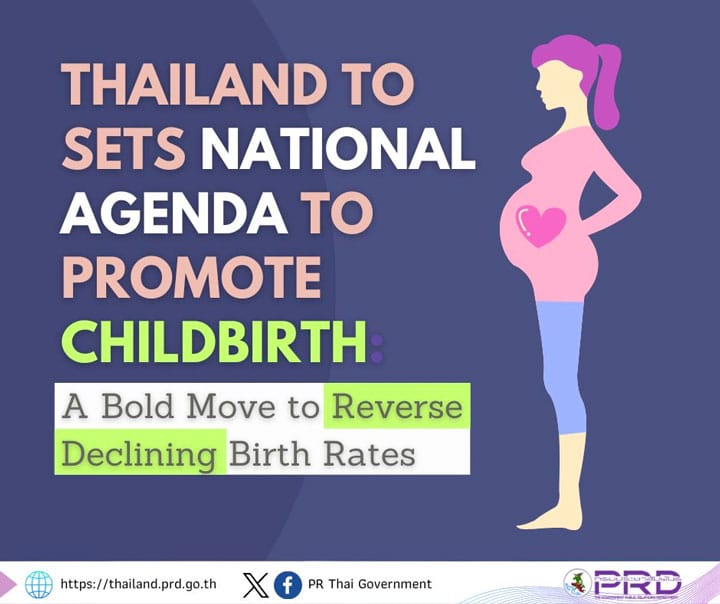Thailand is committed to birth promotion as a national priority
The Thai government has launched a groundbreaking mission to make “birth rate promotion” a national priority by March, aiming to directly address the urgency of the country's declining birth rates. This ambitious initiative aims to address crucial aspects of health, economics and social well-being.
The “Give Birth Great World” initiative, led by the Ministry of Health, will see hospital-based fertility clinics provide comprehensive support. This includes help with planning, diagnosis and treatment of infertility. Thanks to the introduction of advanced reproductive technologies such as Intrauterine Insemination (IUI) and In Vitro Fertilization (IVF), new possibilities are being created for people who dream of parenthood. This promises a better future and stronger human capital.
Efforts are also being made to improve work-life balance, expand financial support for families, streamline parental leave and strengthen inclusive legislation for all who want to start a family. These important measures are intended to counteract declining birth rates.
With an all-time low of just 485.085 new births in 2022 and a continued decline in the population, the urgency of this problem is clear. Without an increase in the birth rate, Thailand risks seeing its population drop to just 33 million people over the next XNUMX years, which would have serious consequences for labor availability and economic stability.
The call has been made to the nation to rally behind this crucial initiative aimed at promoting a thriving and popular Thailand. It's time to spread the word and embrace this call to action for growth and joy for generations to come.



Then they still have a lot to do, when I already see while I'm on holiday here, Nina, how difficult it is, impossible for my wife's daughter to get a few days off to go to the beach with us, and then talk about more balance between work and private life.
I think that strong unions will first be needed to enforce certain things, but whether they will have a right to exist is the question: there will always be some article of law that will be taken out of the mothballs to ban them or make it impossible to work. to make
Finally something goes right naturally; they try to reverse it...
Bee-breeding people! But who pays for those extra mouths if they are produced by the poorest as usual?
It has long been proven that poverty perpetuates many children; school costs, food, clothing. Who pays for that if you don't have a lot of money?
The elite will suffer the worst; if the economy continues to grow with cheap/unskilled labor. They will not breed additionally, because they must remain cosmetically beautiful...
Back to 5 billion worldwide! What a space, peace...a relief...
Assume that Thailand has no child benefit. I think that would help in Thailand to boost birth numbers. By the way, in the municipality where my wife comes from (Noen Maprang), quite a lot is done at primary school to enable poorer families to send their children to school.
However, you hear that families are smaller today than in the past. It often ends with one or two children, while in the past families with more than 5 children were very normal.
yes, there is a form of child allowance.
https://www.unicef.org/thailand/press-releases/thailand-takes-another-leap-towards-universal-child-support-grant.
And in addition, there is a lower income tax rate if you have to take care of children, but that doesn't make much difference if the majority of the population does not have a paid job or a job that yields so little that you do not have to pay income tax.
The fact that fewer children are born per family than before is a sign of a more modern view of children and upbringing. There is no need to start a large family, even due to lower infant mortality and less pressure from parents and grandparents. The Thais also look more calculatingly at the future. Money is just one of the factors that play a role in the decision to have children. Others are: the economic prospects in general, one's own future, the future of the children, low quality of education, relationship problems, opportunities to raise one's own children. Don't forget that more than half of the children in Thailand are not raised jointly by both parents.
Maybe an idea to be a little more careful with the people who have them.
For example, by reducing traffic fatalities and smog-related deaths by enforcing the rules.
Also, 25.000 people die every year from liver cancer by eating dried fish with parasites, and the many deaths caused by alcohol there is still a lot to be gained if one wants. Before you know it you will have 100.000 fewer deaths per year,
Greetings jt.
And another thing, they are afraid that if there are too few people, economic growth will stagnate, but now it is the case that if you want to work but are 38 years old, you can hardly get a job anywhere, let them first start by taking action against this age discrimination.
The average family barely manages to make ends meet, more children cannot be afforded and people forget that even if you put ten children on an already overcrowded world, those ten also hope to grow old and cause a huge gray wave, thus the statement to bring more children into the world makes no sense and makes no sense and go and have a look, it is in Thailand just like in the Netherlands, in the Netherlands the expensive Dutchman is replaced by a cheap Eastern European and the "expensive" Thai is replaced by the Thai boss replaced by a cheap Cambodian worker.
Gr. Arno